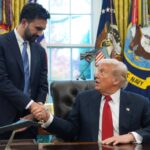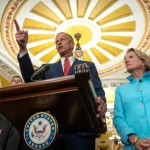
Authored by Francis P. Sempa via RealClear Wire,
Retired U.S. Army LTC Alexander Vindman, who gained fame for helping Democrats impeach President Donald Trump for a phone call Trump had with Ukrainian officials in July 2019, is urging the Biden administration and its Western allies to swiftly and dramatically increase military aid and supplies to Ukraine to help the Ukrainian armed forces credibly threaten to take back Crimea, which Russian forces seized in 2014. He lays out a Ukrainian military campaign--armed and funded by the United States and its NATO allies--that he claims will cause Russian President Vladimir Putin to negotiate a Russian withdrawal from Crimea and reduce the risk of a wider war. Vindman is reminiscent of those European statesmen and generals before and during World War I who thought that mobilizing for war would somehow prevent it and, if not, would result in a swift victory.
Writing on the Foreign Affairs website, Vindman notes that Ukrainian President Volodymyr Zelenskyy made a video appeal at the meeting of the World Economic Forum, saying: “Crimea is our land, our territory,” and requesting Western nations to “give us your weapons” so that Ukraine can retake “what is ours.” In his article, Vindman urges Washington and NATO to “give Ukraine the weapons and assistance it needs to win quickly and decisively in all occupied territories north of Crimea--and to credibly threaten to take the peninsula militarily.” Vindman suggests that a credible threat to militarily retake Crimea will be sufficient to bring Putin to the negotiating table and end the war on terms favorable to Ukraine.
Vindman has been one of the most vociferous war hawks when it comes to U.S. involvement in the Russia-Ukraine War. Politico reports that Vindman is organizing a group of experienced American military contractors “who would travel to Ukraine and embed themselves with small units near the front lines” and provide Ukrainian forces with “military logistics support.” Back in the summer of 2022, Vindman traveled to Ukraine to help the country wage successful war against Russia. He called the Ukraine war “the most important geopolitical event of the last 20 years & maybe the next 20 years.”
And Vindman has not shied away from partisan politics in his “geopolitical” analysis. He has blamed former President Trump, Trump’s Secretary of State Mike Pompeo, the Republican Party, and Fox News for “emboldening Russia to invade Ukraine,” even though Russia’s invasions of Ukraine occurred during the Obama and Biden administrations. “There is blood on the Republican Party’s hands,” Vindman said. “They were partially responsible for what is happening in Ukraine.”
Vindman claims that if the U.S. and NATO continue to provide military assistance to Ukraine incrementally instead of giving Ukraine everything it needs now, the risk of widening the war and embroiling NATO in the conflict will increase. But, he claims, with swift and decisive Western military support, including hundreds of tanks, infantry fighting vehicles, advanced fighter aircraft, long and short-range missiles, and thousands of rocket systems, Ukraine can credibly threaten to retake Crimea, which he claims will force Putin to negotiate, withdraw from Crimea, and will supposedly reduce the risks of a wider war.
Vindman even lays out a tactical strategy that includes tying down Russian forces in the Luhansk, Kherson, and northern Donetsk regions, severing Russia’s land route to Ukraine by pushing through to the Sea of Azov, and interfering with Russia’s military resupply route by destroying the Kerch Strait Bridge that connects Russia to the Crimea. This would be followed by “weeks of strikes” on Russian armed forces, including air bases, naval installations, transportation nodes, and command and control centers. Then Ukraine would launch “land and amphibious attacks to gain a foothold in Crimea,” and move on to seize Russia’s naval installation at Sevastopol, the capital of Simferopol, Feodosiya, and Kerch. Unless, that is, the Clausewitzian “friction” of war intervenes, as it usually does.
There are a lot of assumptions underlying Vindman’s plan. One is his claim that “Western officials are less worried about Russian nuclear saber rattling than they once were.” He does not identify who those officials are or why they are allegedly less worried about nuclear escalation. Another assumption is that a dramatic increase in Western military supplies--giving Ukraine everything it needs to defeat Russia--is less dangerous than what he calls “incremental escalation.” And Vindman assures us that “Putin has no interest in a fight with NATO.” Presumably, that includes a NATO that supplies Ukraine with everything it needs to defeat Russia.
Perhaps Vindman’s most questionable assumption--which is not mentioned in the Foreign Affairs article, but that he voiced after his trip to Ukraine in the summer of 2022--is that Russia’s invasion of Ukraine is “the most important geopolitical event of the last 20 years.” Others would argue that China’s rise--economically and militarily--and its expanded influence throughout Eurasia and beyond is a more important geopolitical event, especially when it is coupled with the growing strategic partnership between China and Russia. In the past, American statesmen recognized the importance of maintaining the geopolitical pluralism of Eurasia. It is why we sided with Stalin against Hitler. It is why we sided with Mao against the Soviet regime. But all the Vindman approach does is to push Russia even closer to China. And as tensions increase in the western Pacific over Taiwan, Vindman’s counsel may get us into a two-front war that nobody should want.
Francis P. Sempa is the author of Geopolitics: From the Cold War to the 21stCentury, America’s Global Role: Essays and Reviews on National Security, Geopolitics and War, and Somewhere in France, Somewhere in Germany: A Combat Soldier’s Journey through the Second World War. He has written lengthy introductions to two of Mahan’s books, and has written on historical and foreign policy topics for The Diplomat, the University Bookman, Joint Force Quarterly, the Asian Review of Books, the New York Journal of Books, the Claremont Review of Books, American Diplomacy, the Washington Times, The American Spectator, and other publications. He is an attorney, an adjunct professor of political science at Wilkes University, and a former contributing editor to American Diplomacy.
Authored by Francis P. Sempa via RealClear Wire,
Retired U.S. Army LTC Alexander Vindman, who gained fame for helping Democrats impeach President Donald Trump for a phone call Trump had with Ukrainian officials in July 2019, is urging the Biden administration and its Western allies to swiftly and dramatically increase military aid and supplies to Ukraine to help the Ukrainian armed forces credibly threaten to take back Crimea, which Russian forces seized in 2014. He lays out a Ukrainian military campaign–armed and funded by the United States and its NATO allies–that he claims will cause Russian President Vladimir Putin to negotiate a Russian withdrawal from Crimea and reduce the risk of a wider war. Vindman is reminiscent of those European statesmen and generals before and during World War I who thought that mobilizing for war would somehow prevent it and, if not, would result in a swift victory.
Writing on the Foreign Affairs website, Vindman notes that Ukrainian President Volodymyr Zelenskyy made a video appeal at the meeting of the World Economic Forum, saying: “Crimea is our land, our territory,” and requesting Western nations to “give us your weapons” so that Ukraine can retake “what is ours.” In his article, Vindman urges Washington and NATO to “give Ukraine the weapons and assistance it needs to win quickly and decisively in all occupied territories north of Crimea–and to credibly threaten to take the peninsula militarily.” Vindman suggests that a credible threat to militarily retake Crimea will be sufficient to bring Putin to the negotiating table and end the war on terms favorable to Ukraine.
Vindman has been one of the most vociferous war hawks when it comes to U.S. involvement in the Russia-Ukraine War. Politico reports that Vindman is organizing a group of experienced American military contractors “who would travel to Ukraine and embed themselves with small units near the front lines” and provide Ukrainian forces with “military logistics support.” Back in the summer of 2022, Vindman traveled to Ukraine to help the country wage successful war against Russia. He called the Ukraine war “the most important geopolitical event of the last 20 years & maybe the next 20 years.”
And Vindman has not shied away from partisan politics in his “geopolitical” analysis. He has blamed former President Trump, Trump’s Secretary of State Mike Pompeo, the Republican Party, and Fox News for “emboldening Russia to invade Ukraine,” even though Russia’s invasions of Ukraine occurred during the Obama and Biden administrations. “There is blood on the Republican Party’s hands,” Vindman said. “They were partially responsible for what is happening in Ukraine.”
Vindman claims that if the U.S. and NATO continue to provide military assistance to Ukraine incrementally instead of giving Ukraine everything it needs now, the risk of widening the war and embroiling NATO in the conflict will increase. But, he claims, with swift and decisive Western military support, including hundreds of tanks, infantry fighting vehicles, advanced fighter aircraft, long and short-range missiles, and thousands of rocket systems, Ukraine can credibly threaten to retake Crimea, which he claims will force Putin to negotiate, withdraw from Crimea, and will supposedly reduce the risks of a wider war.
Vindman even lays out a tactical strategy that includes tying down Russian forces in the Luhansk, Kherson, and northern Donetsk regions, severing Russia’s land route to Ukraine by pushing through to the Sea of Azov, and interfering with Russia’s military resupply route by destroying the Kerch Strait Bridge that connects Russia to the Crimea. This would be followed by “weeks of strikes” on Russian armed forces, including air bases, naval installations, transportation nodes, and command and control centers. Then Ukraine would launch “land and amphibious attacks to gain a foothold in Crimea,” and move on to seize Russia’s naval installation at Sevastopol, the capital of Simferopol, Feodosiya, and Kerch. Unless, that is, the Clausewitzian “friction” of war intervenes, as it usually does.
There are a lot of assumptions underlying Vindman’s plan. One is his claim that “Western officials are less worried about Russian nuclear saber rattling than they once were.” He does not identify who those officials are or why they are allegedly less worried about nuclear escalation. Another assumption is that a dramatic increase in Western military supplies–giving Ukraine everything it needs to defeat Russia–is less dangerous than what he calls “incremental escalation.” And Vindman assures us that “Putin has no interest in a fight with NATO.” Presumably, that includes a NATO that supplies Ukraine with everything it needs to defeat Russia.
Perhaps Vindman’s most questionable assumption–which is not mentioned in the Foreign Affairs article, but that he voiced after his trip to Ukraine in the summer of 2022–is that Russia’s invasion of Ukraine is “the most important geopolitical event of the last 20 years.” Others would argue that China’s rise–economically and militarily–and its expanded influence throughout Eurasia and beyond is a more important geopolitical event, especially when it is coupled with the growing strategic partnership between China and Russia. In the past, American statesmen recognized the importance of maintaining the geopolitical pluralism of Eurasia. It is why we sided with Stalin against Hitler. It is why we sided with Mao against the Soviet regime. But all the Vindman approach does is to push Russia even closer to China. And as tensions increase in the western Pacific over Taiwan, Vindman’s counsel may get us into a two-front war that nobody should want.
Francis P. Sempa is the author of Geopolitics: From the Cold War to the 21stCentury, America’s Global Role: Essays and Reviews on National Security, Geopolitics and War, and Somewhere in France, Somewhere in Germany: A Combat Soldier’s Journey through the Second World War. He has written lengthy introductions to two of Mahan’s books, and has written on historical and foreign policy topics for The Diplomat, the University Bookman, Joint Force Quarterly, the Asian Review of Books, the New York Journal of Books, the Claremont Review of Books, American Diplomacy, the Washington Times, The American Spectator, and other publications. He is an attorney, an adjunct professor of political science at Wilkes University, and a former contributing editor to American Diplomacy.
Loading…







